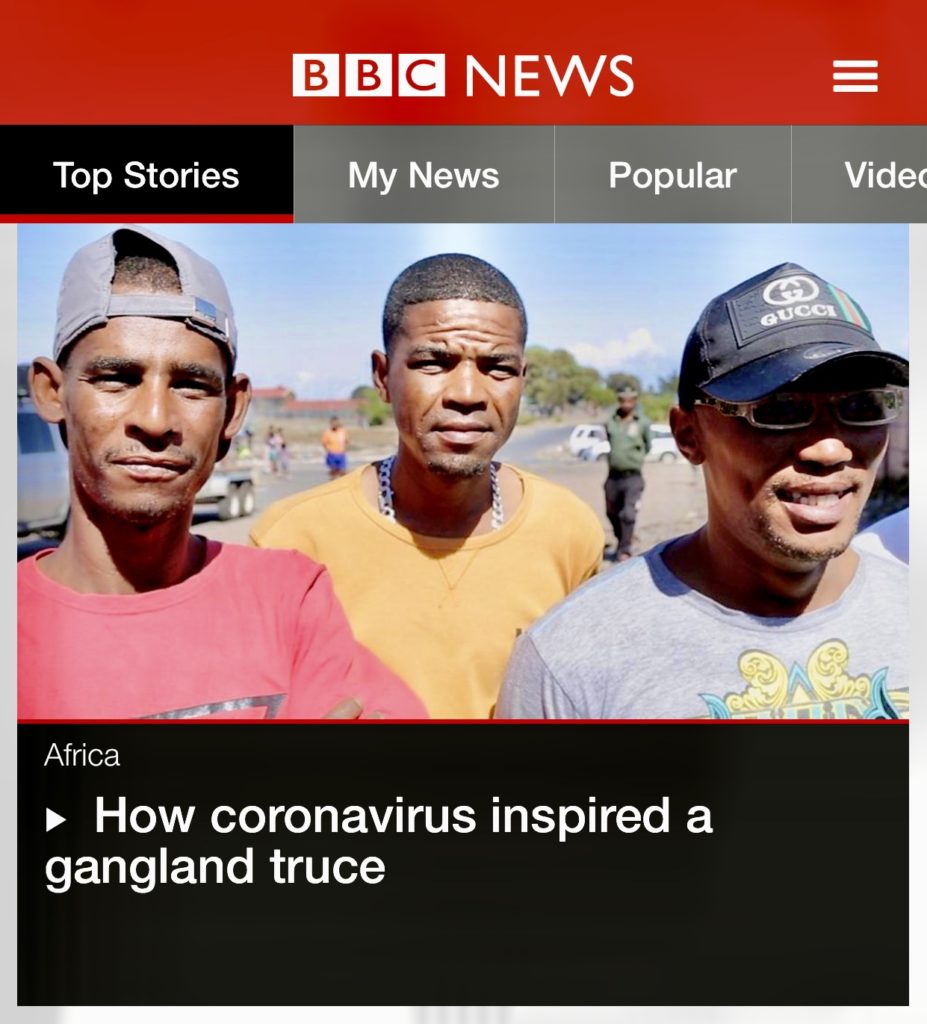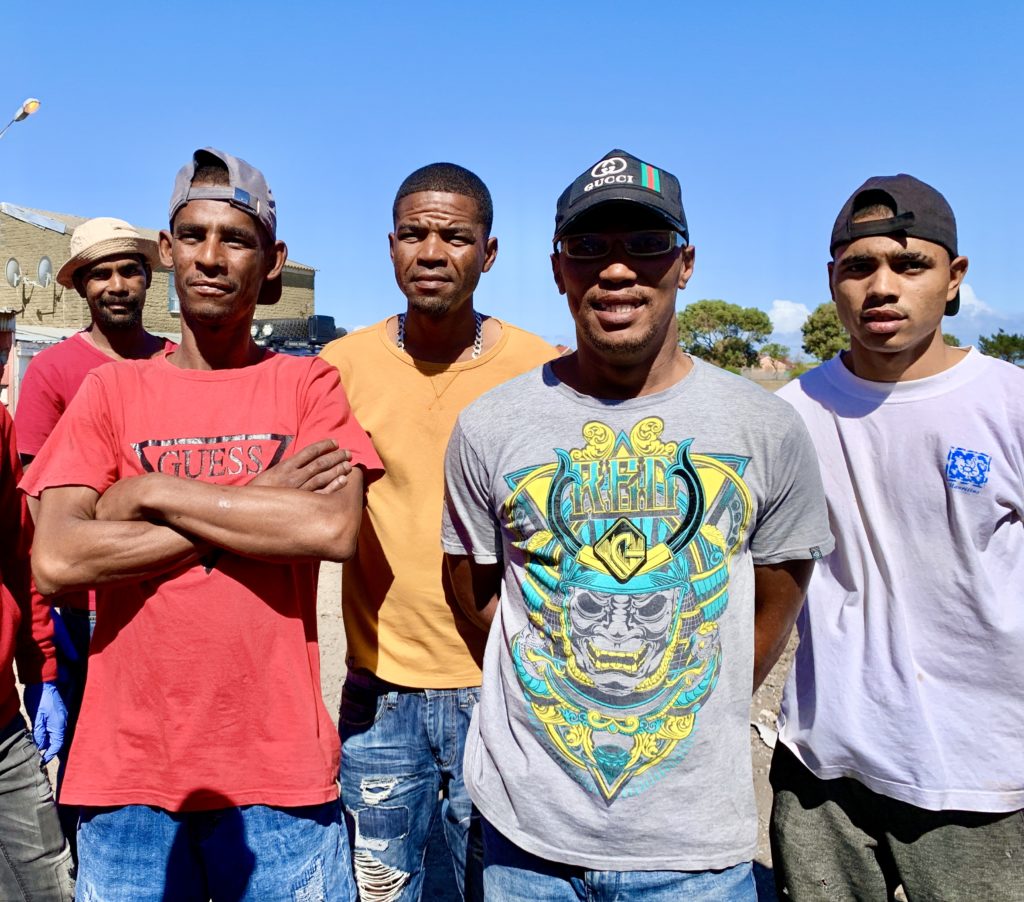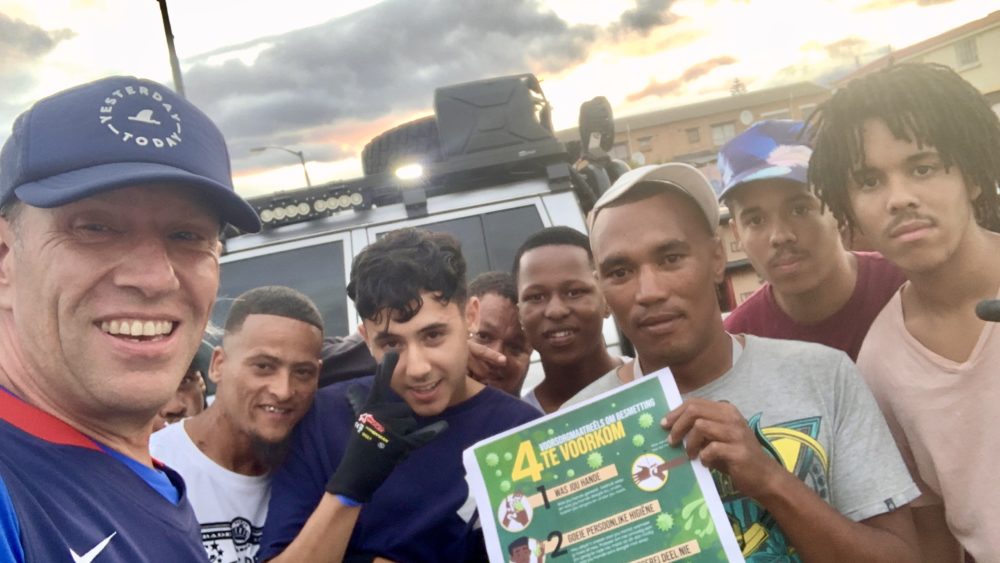The Aussie 'crazy guy' bringing rival South African gangs together
“Seeing a couple of hundred gangsters working together … that’s a pretty beautiful thing.”
News crews from major networks such as the BBC and CBS have had to face the terrifying prospect of going into some of the most dangerous streets in South Africa to report on a remarkable truce between rival gangs in Cape Town.
Watching on in amusement has been Sydney-born community pastor Andie Steele-Smith, who laid the groundwork for this truce between sworn enemies that the community sees as a miracle.
“The gangs are working together and it’s a beautiful thing.” – Andie Steele-Smith
It was through his initiative that notorious gangs in Fisantekraal and Manenberg, such as the Americans, the Jesters and the Clever Kidz, have pulled together to distribute soap, food and other essential supplies to their communities.
For Steele-Smith, the miracle is not so much the truce but the fact that members of the most prominent gangs are working together to deliver tonnes of food to thousands of vulnerable and needy residents, who are housebound because of the COVID-19 lockdown.
“The key thing is not the truce – there’s been ceasefires before – but nobody in the community has ever seen these boys walking side by side and working together and then having a chat and a meal or praying together,” explains Steele-Smith. He was speaking to Eternity via a Zoom call from his home in Western Cape, where he lives with his wife Rachel and six children, two of whom are unofficially adopted from Fisantekraal township.
Strangely enough, although the peace is still holding after several weeks, some people are angry about it.
“I think some of the community actually don’t want change. I’ve seen rumours spreading that actually the boys are still trafficking weapons, but now they’re trafficking guns through plastic bags filled with food,” he says.
“I just roared with laughter – I thought it was the funniest thing I ever heard. But there’s a handful of people angry because somebody has come and changed the dynamic, but none of the gangs are angry. The gangs are working together and it’s a beautiful thing.”
‘Nothing is impossible’
For Steele-Smith, feeding people is an unlooked-for benefit of his efforts to disciple the rival gangs. Among their number are many convicted killers but the Australian has been ministering to them for five to six hours each day, for about three years.
“To me the food is the unintended consequence of COVID-19 … but it’s not really my focus; my focus has been peace among the gangs and have the boys see each other in the same way that I see them – as human beings and just the same as me,” he says.
“So my hope and prayer is that after COVID-19 finishes – I know some of these boys will go back to their old ways because it’s just instinct; and unless we disciple them all, then that’s going to happen and I’m cognisant of that. But I’m also cognisant that if one of them lines up another one in their gun sights and they’ve become friends, hopefully they’re gonna actually think twice about whether to pull the trigger.”

Asked if he had ever anticipated seeing such a truce, Steele-Smith says “yes and no.”
“I’ve learned through experience in life that really nothing is impossible for God.”
“I think it’s less likely that God could get me to Africa as a self-funded missionary than it is that he could get these guys to get into a truce and to love each other.
“I used to live in a big house and had many cars in the driveway and money was important to me, so the idea of being in Africa in a missional context is probably more miraculous, in my book, than seeing these guys get together.
“I’m not shocked by it but I also can’t quite believe my eyes as to how beautiful it is in application.
“I knew that one or two or three or four or maybe six or eight could work together – I just knew that in my spirit – but seeing a couple of hundred gangsters from different gangs on different days working together … that’s a pretty beautiful thing.”
“God gave me a picture that these guys were all the same as me and that was very humbling.” – Andie Steele-Smith
From wealthy Australia to gangland LA
Born in Sydney to conservative Christian parents, Steele-Smith was what he describes as “your average cutthroat businessman” before God called him to South Africa about seven years ago.
Four years earlier, he had reached a dramatic turning point while visiting a friend in Los Angeles who ran a Christian rehab centre called Dream Center, which led to him working among the gangs in LA.
“When I walked in there for the first time, God just wrecked me, and he gave me a picture that these boys and girls were the same as me.”
“Drug dealers, gang leaders, pimps, prostitutes, etc – he gave me a picture that these guys were all the same as me and that was very humbling.
“I was invited to preach there the next day. After I preached, God actually convicted me that these boys were all better than me because they were facing their worst demons. They didn’t have the nice watches, nice cars and nice wife, a nice house to hide behind.
At that point, Steele-Smith believes God put two Scriptures on his heart: Matthew 25:40 – “Surely as you do to the least of these you do unto me” – and Micah 6:8 – “What does the Lord want of you, but pursue justice and mercy, and walk humbly with your God.”
Steele-Smith, who calls himself “probably just a crazy guy,” adds: “All of a sudden my life turned from pursuing my empire to pursuing his kingdom.”
 When the former investment banker, who calls himself “the least practical person on the face of humanity” and “a pontificator”, arrived in South Africa, he imagined himself sitting on the boards of a few charities.
When the former investment banker, who calls himself “the least practical person on the face of humanity” and “a pontificator”, arrived in South Africa, he imagined himself sitting on the boards of a few charities.
But God had a very different plan.
“We were at a church who asked us if we’d start a men’s Bible study in the local township [Fisantekraal] and I said ‘yeah, sure, no problems.’
“The first thing I said was ‘who’s been running it? I’d like to meet them.’ They said ‘nobody’s ever run it at this township, everyone’s too scared to go there.’”
“It’s such an unusual thing for people outside of a community like that to come in.” – Andie Steele-Smith
Bonding over a BBQ
But with his background in ministry to gang members and the homeless in the US (as well as the UK), Steele-Smith was not deterred. The first week he put on a Braai (a barbecue) for the township’s youth. Eight boys came along.
“By week six or eight, we had 150 young men around a fire for three hours one night a week. It started building relationship in that community,” remembers Steele-Smith.
“From that we started trying to help those boys address the needs in that community so when there was a fire we’d go and help put the fire out – and we’d help rebuild afterwards.
“Three years ago, there was a massive storm here called the Cape Storm which raged non-stop for four days. In our local township, 1200 shacks were destroyed. With the help of about 100 kids in that community, we just started rebuilding … We ended up rebuilding every single one.”
Then a year and a half ago, after a “shack fire” burned down 700 shacks in the biggest township, Khayelitsha, Steele-Smith turned up with his twin boys and started building.
“We stayed there for 28 days and helped rebuild 700 shacks and … the community unified in and of itself.”
“It’s such an unusual thing for people outside of a community like that to come in.
“So that that kind of stood out in their community.”
“If the biggest bad guy has a fundamental desire to do good and be good, then that is something.” – Andie Steele-Smith
The turning points in gang ministry
Steele-Smith said two radical things happened after a smaller shack fire in Mbekweni last January. These events were pivotal in developing the gang ministry.
“The first is that that the general of one of the biggest gangs – so, in other words, the most senior gangster – worked side by side with us the whole time,” shares Steele-Smith. “That just showed me that even the kingpin cares about people and he wanted to do good and to be good.
“I figured if the kingpin, if the guy who had been in jail for many years, if the biggest bad guy has a fundamental desire to do good and be good, then that is something.”
A couple of days later, six young gangsters come to attack him and his twin boys with knives. As a former bouncer, Steele-Smith was not fazed and stood his ground.
“So I grab my boys, I put them behind me, and I instinctively – and I don’t know even really know why I did it, it was just a Holy Spirit thing – I grabbed the leader of the gang and I hugged him and I kissed him.
“He started crying straight away and he put his knife in his pocket and he said ‘Oum,’ which means uncle. ‘Uncle, can I have a hammer to build with you please?’
“He literally put his knife down and picked up a hammer.”
“I figured two things: these guys want to do good and be good – and they just need a dad, they need somebody that loves them and says, ‘hey, I’m in your corner.’”
“The first two rows are for the pastors and the third, fourth and fifth are for the gangsters.” – Andie Steele-Smith
A couple of months later, Steele-Smith put on another Braai one Friday night in Manenberg – a really dangerous place where very few white people go.
“We just intentionally parked ourselves on a street corner outside our main gang house and went in and said ‘hey, boys, do you want to eat?’ They’re looking at us like ‘do we kill you, or will we eat your food first and then we’ll worry about whether we kill you later?’”
“By the end of dinner, we were friends and we went from there.”
Treat people like they are people. Simple
How has a wealthy Australian turned missionary been able to establish friendships with such violent gangsters? Steele-Smith explains his approach: “These kids are not babies – I mean some of them are 13 but for the most part they’re sort of 20 to 30. But as soon as somebody believes in them and goes up and says ‘hey, I’m not scared of you. How you doing? How’s your family, what’s going on?’, they just melt.”
“I’ll meet a new gang member and they’ll be standing there with a hand on a gun, looking very dangerous.
“I’ll go up and make a silly joke like, ‘hey, man your fly’s undone.’ They look down, see it’s not, then all of a sudden you’ve got them.
“They’re just people.
“I think the key to what’s happened here is we treat people like they are people and – guess what? – they treat us like we’re people.”
While Steele-Smith has no theological training – his biggest educational claim to fame is he failed at four separate universities – he has earned the status of a pastor in the community, through his ministry experiences.
He attends Hillsong Church in Cape Town, which has provided him with a bus to pick up about 40 gangsters to attend church.
“It’s quite funny. The first two rows are for the pastors and the third, fourth and fifth are for the gangsters. I think there’s something synergistic about that!”
Email This Story
Why not send this to a friend?


